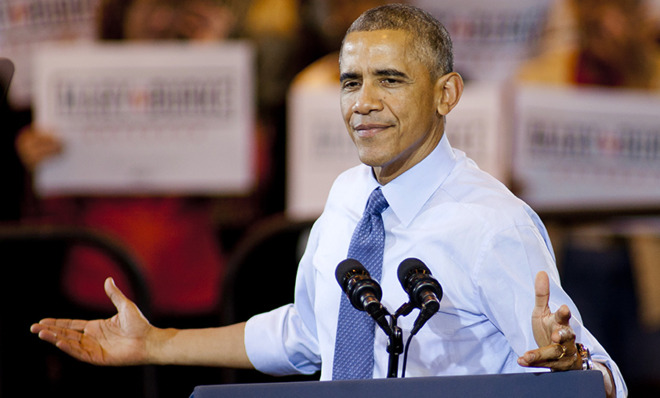The GOP said Obamanomics would kill the economy. It didn't. Now what?
As the American economy improves, Republicans will have to update their priorities


A free daily email with the biggest news stories of the day – and the best features from TheWeek.com
You are now subscribed
Your newsletter sign-up was successful
The American economy in 2015 will probably pale in comparison to the big booms of the 1980s and 1990s. But thanks partly to the 50 percent drop in oil prices since summer, it may be the strongest year for growth since before the Great Recession.
The Two Percent Economy becomes the Three Percent Economy. Stagnation becomes acceleration. What Goldman Sachs recently told clients roughly reflects Wall Street's consensus view:
The U.S. economy is likely to grow about 3 percent next year, almost 1 percentage point above potential. We expect further acceleration in consumer spending, mainly because of the positive impact of the oil price plunge on real income. We also expect the housing recovery to strengthen as household formation starts to normalize... Above-trend GDP growth should translate into continued brisk labor market improvement. [Goldman Sachs]
The Week
Escape your echo chamber. Get the facts behind the news, plus analysis from multiple perspectives.

Sign up for The Week's Free Newsletters
From our morning news briefing to a weekly Good News Newsletter, get the best of The Week delivered directly to your inbox.
From our morning news briefing to a weekly Good News Newsletter, get the best of The Week delivered directly to your inbox.
So bullish, but not totally bonkers. But this is still a political problem for Republicans heading into the 2016 election cycle.
The party's messaging is built around blaming President Obama's progressive policies — the Affordable Care Act (aka ObamaCare), the Dodd-Frank overhaul of the financial regulatory system, energy regulation, tax hikes on the rich — for the weak economic recovery. Some Republicans have gone even further in the past six years, predicting just-around-the-corner catastrophe — soaring interest rates, rocketing prices, a collapsing dollar — due to "Obamanomics."
Such apocalyptic forecasts look silly in retrospect. The dollar is at a nine-year high, interest rates remain low, and inflation is still well below the Federal Reserve's 2 percent target. The only thing that has collapsed is the annual U.S budget deficit, from nearly 10 percent of GDP in 2009, to under 3 percent last year. One reason: Non-defense discretionary spending is headed toward its lowest levels in modern history.
Republicans are on firmer ground with their more modest claim that Obama's agenda slowed the recovery. While economists continue to debate the exact impact of the 2009 stimulus, it is tough to find an economic theory supporting the 2013 tax increases on the wealthy as good for growth.
A free daily email with the biggest news stories of the day – and the best features from TheWeek.com
Meanwhile, research suggests new financial regulations are particularly onerous to community banks, which provide nearly half of the loans issued to small businesses. (Of course, Team Obama would counter that the GOP's push for spending cuts and the 2011 debt ceiling crisis did the economy no favors.)
But as campaign pros put it, if you're explaining, you're losing. Making the case that an improving economy would be improving even faster with smarter GOP policies isn't as politically compelling as simply pointing to an economy in flames and blaming the guy in the Oval Office. Also, a lot harder.
What's more, the GOP's recent aversion to the Federal Reserve makes it tough to offer up active monetary policy as an alternate theory — despite its explanatory power — for why the U.S. is doing far better than other advanced economies right now.
It's not just that Republicans need to offer a positive agenda; they also need one that goes beyond an obsession with deficits and debt and that tackles the everyday concerns of most Americans.
For instance: One big worry for many parents is that their kids will have less opportunity than they did. Upward mobility should be at the heart of a pro–middle class Republican platform. How interesting, then, to check out the mission statement of potential 2016-er Jeb Bush's just-announced Super PAC, Right to Rise. No mention of "taxes" or "debt" or "spending." Instead, it acknowledges the problem of rising income inequality — from 2010 through 2013, median incomes rose for only the wealthiest 10 percent of households, according to the Federal Reserve — and increasing barriers to climbing the opportunity ladder.
Who knows how all that translates into specific policy. But it is a good start. The U.S. economy has plenty of pressing problems, just often not the ones Republicans have been most worried about.
James Pethokoukis is the DeWitt Wallace Fellow at the American Enterprise Institute where he runs the AEIdeas blog. He has also written for The New York Times, National Review, Commentary, The Weekly Standard, and other places.
-
 Local elections 2026: where are they and who is expected to win?
Local elections 2026: where are they and who is expected to win?The Explainer Labour is braced for heavy losses and U-turn on postponing some council elections hasn’t helped the party’s prospects
-
 6 of the world’s most accessible destinations
6 of the world’s most accessible destinationsThe Week Recommends Experience all of Berlin, Singapore and Sydney
-
 How the FCC’s ‘equal time’ rule works
How the FCC’s ‘equal time’ rule worksIn the Spotlight The law is at the heart of the Colbert-CBS conflict
